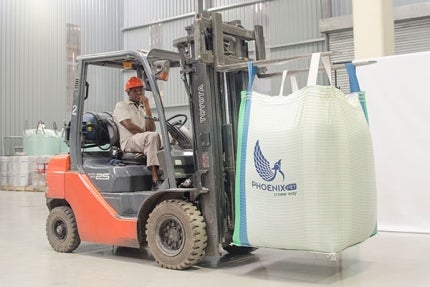
South Africa’s biggest PET (polyethylene terephthalate) bottle recycler Extrupet inaugurated its new Bottle-2-Bottle (B2B) recycling plant in Africa in May 2015. The facility is an extension to Extrupet’s first African B2B recycling plant located in Wadeville, Johannesburg. The extension was built with an investment of R75m ($6m).
The new facility produces resin suitable for food contact PET packaging and also processes recycled resin for the carbonated drink sector. It is first to use Coca-Cola-approved technology to produce carbonated soft drink bottles, while making Africa the first country in the continent to use recycled PET (rPET) for Coca-Cola products.
The plant also helps the industry to achieve its target of 50% PET (polyethylene terephthalate) recycling rate by 2015 and the recycling target of 70% or 170,000t of PET by 2022. It further ensures long-term viability of PET plastics recycling in the country by recycling post-consumer bottles back into new PET bottles.
Production
The plant produces 14,000t of PET resin by processing 22,000t of post-consumer PET bottles a year. It provides additional supply to the PET packaging industry, diverts PET bottles from landfills and reduces resource consumption. The food-grade rPET produced in the plant is sold under Extrupet’s brand PhoenixPET.
The facility can provide high-quality output to meet the growing local and regional demand in the bottle and thermoforming industry for environment-friendly and sustainable packaging.
It generates 15,000 indirect jobs, which involve the collection of approximately 22,000t of post-consumer PET bottles.
Technology at the PhoenixPET recycling plant
The 3,000m² extension is equipped with Starlinger recycling technology, which is a tried and tested technology worldwide.
It complies with US Food and Drug Administration (FDA) standards and meets the performance and food approval requirements of regulators and brand owners around the world.
The plant uses Coca-Cola-approved technology for carbonated soft drink bottles and European Food Safety Authority (EFSA) approved technology for producing food-safe PET that can be used in up to 100% rPET content applications.
PET Bottle-2-Bottle recycling process
PET is a popular packaging material used across worldwide. PET resin offers transparency, rigidity and strength thus promoting innovative designs for light weight and shatterproof packaging.
Mpact, the paper and plastic packaging manufacturer based in South Africa is building a state-of-the-art polyethylene terephthalate (PET) recycling plant in Wadeville, Germiston.
PET Bottle-2-Bottle recycling involves collection of post-consumer PET bottles and recycling them to produce resin, which can be used to make new PET bottles. Also known as closed loop recycling, the method enables most sustainable use of raw material by closing the loop where the resin can be used and re-used repeatedly.
The recycling process begins with separating the PET bottles followed by basic cleaning, which removes large dirt particles. The bottles are shredded to flakes after cleaning. The flakes are dry pre-cleaned in a caustic cleaning process, which removes the remaining labels and adhesives completely.
The next step includes separation of heavier flakes from lighter ones. The flakes again undergo a multi-stage cleaning sequence followed by drying to completely remove any non-PET solid material.
The PET flakes are then melted to form PET pellets while eliminating the impurities. The pellets are decontaminated using high-temperature and a vacuum system to remove any unwanted substances to yield rPET flake or pellet suitable for food contents.
Economic and sustainable benefits of the plant
The bottle-2-bottle recycling plant caters to local and global demand for sustainable packaging and increases local collection of bottles for recycling. It thus satisfies the government’s rule to reduce the amount of material going to landfill.
The usage of rPET for packaging saves natural resources and minimises waste-to-landfill as less number of bottles are sent to landfill. The use of food grade recycled PET consumes less energy, resulting in reduced net carbon emissions.
The current plant diverts an additional 22,000t of post-consumer PET bottles from landfill, saves 136,400m³ of landfill space a year at full capacity, and generates 33,000t of carbon savings a year.







